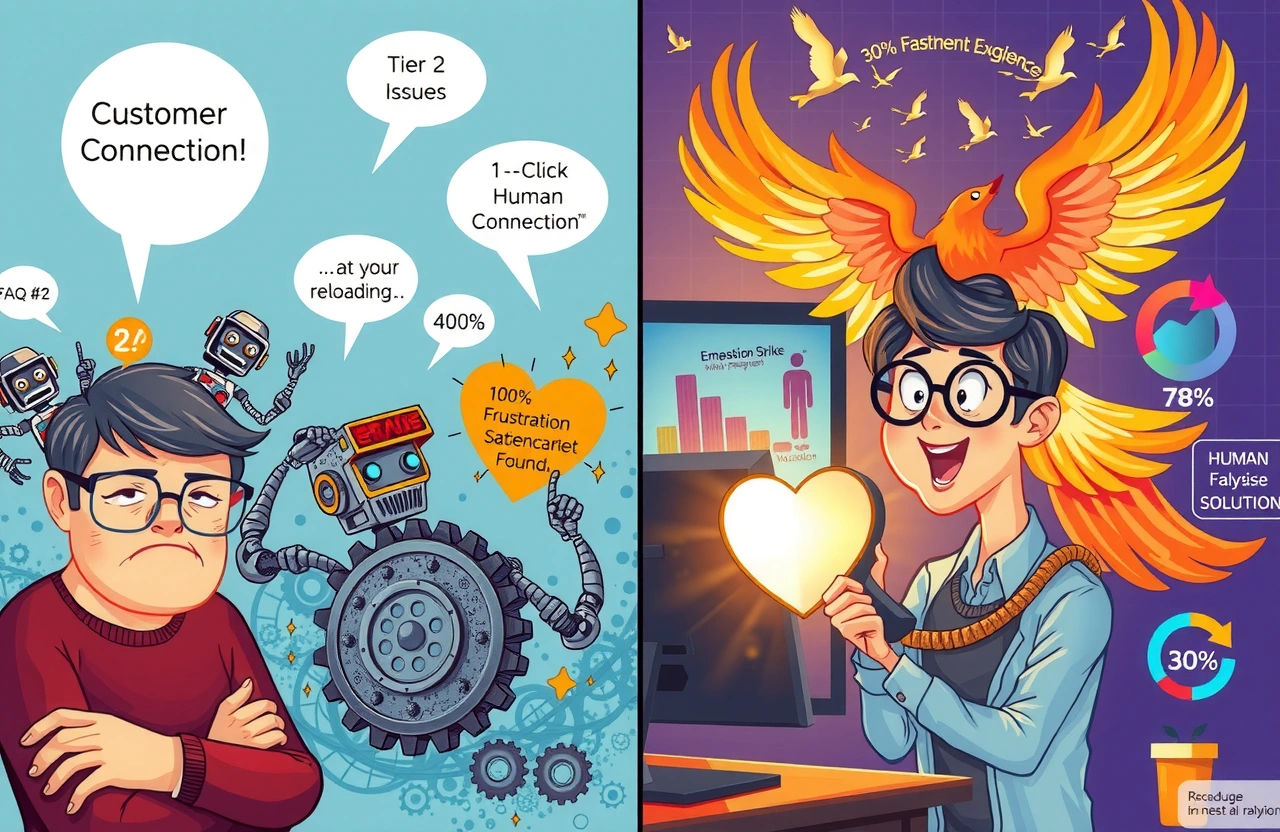Remember waiting indefinitely as a chatbot loops through irrelevant options? You’re not alone. Across industries, consumers are rejecting scripted responses for authentic human connection. This widespread chatbot fatigue has ignited a counter-movement championing skilled agents who understand nuance. Businesses now face critical decisions about balancing efficiency with empathy. How companies manage this transition will define their customer experience for years to come.
The Breaking Point: Why Chatbot Disillusionment Peaked
Consumers initially welcomed chatbots promising 24/7 solutions. But repetitive dead-ends revealed their limitations:
- Most handle only 15-20% of queries without escalation (Forrester)
- 67% abandon interactions feeling misunderstood (PwC Customer Experience Survey)
- Sentiment analysis shows frustration spikes with phrases like “I want a human” rising 154% (Clarabridge, 2023)
Emotional Intelligence Deficits in Critical Moments
Bots falter when emotions run high. Consider subscription cancellations where algorithms trigger retention scripts while customers crave acknowledgment of valid complaints. Healthcare provider BlueCross saw call-backs surge 40% after problematic bot implementations during insurance disputes. Such failures teach us: efficiency gains vanish when damaging customer experience.
Complex Query Collapse Points
Multi-layered issues expose AI’s rigid logic. Studies show:
- Tier 2 issues require human intervention 91% of the time
- Customers repeat themselves 3× more with bots than humans
- Integration gaps leave agents unaware of bot histories, needing recap conversations
Reshaping Support: The Human Renaissance
Forward-thinking brands recognize the pendulum swing. Banks like Chase now offer immediate call-back buttons during digital journeys—acknowledging some conversations demand lived experience. Why the shift resonates:
- Agents solve issues 30% faster on second-tier problems
- 78% of consumers pay premiums for human-backed service models
- Emotional connection builds trust; 68% forgive errors from companies with responsive human support
The Empathy Dividend in Customer Experience
Personalized service creates advocates. Luxury retailer Moda Operandi credits its stylist-led virtual appointments for a 23% retention boost during their switch from pure automation. Customers describe feeling “heard” instead of processed, proving empathy turns recovery moments into loyalty builders.
Hybrid Models: The Gold Standard
Success requires strategic handoffs:
- Bots handle routine tasks (order tracking, password resets)
- AI flags rising frustration cues like repeated queries
- Seamless agent transfers occur before dissatisfaction peaks
Delta Airlines’ tiered system slashed complaint volumes by routing repetitive tasks while reserving live experts for baggage crises—their Net Promoter Score grew 14 points within a year. Learnings detailed in McKinsey’s hybrid service playbook illustrate this transformation.
Implementation Roadmap: Tactical Shifts for 2024
Reintegrating human support demands operational precision
Redefining Agent Roles as Solution Architects
Top performers now receive specialized training in:
- Emotional de-escalation techniques
- Cross-departmental problem mapping
- Context reconstruction from fragmented bot sessions
Software giant SAP increased complex-issue resolutions by training technical coaches who guide agents through intricate cloud setups via screen-sharing tools instead of scripted chats.
Technology That Enables Humans
Tools must empower agents:
- Integrated dashboards showing full interaction history
- Knowledge bases curated from resolved escalations
- Quick-access troubleshooting trees without form-swapping
Phone service provider OpenPhone credits its unified interface for reducing agent handle time by 25% despite handling more complex complaints.
Restructuring Metrics Around Experience Outcomes
Track key indicators beyond efficiency:
- First-contact resolution for escalated cases
- Avoidable callback rates
- Lifetime value impact per resolution path
Merrill Lynch overhauled KPIs to reward experience consistency. Their customer effort scores improved 32% within two years by prioritizing friction-reducing solutions.
Featured Innovation: Brands Leading the Change
These companies revealed quantifiable success via human-first pivots:
Zappos: Emotional Resonance Engine
The footwear retailer eliminated tiered support entirely. Agents have unlimited call times and decision authority. Outcomes include:
- 75-minute calls resolving multiple issues permanently
- Customer experience ratings averaging 94% satisfaction
- Word-of-mouth referrals doubling year-over-year
U.S. Bank: Empathetic Finance
By analyzing chatbot failure points, they redeployed agents as “financial health assistants.” Integrating quick-access loan adjustments and hardship programs into accelerated escalation paths cut complaints by 60% while increasing debt recovery rates.
Future-Proofing Your Customer Experience Ecosystem
The end goal isn’t reverting to 1990s call centers. Winners will combine automation’s scale with human ingenuity—especially while integrating emerging tools like generative AI. Three existential questions for executives:
- Do our escalation paths respect customers’ time frustration?
- Does agent training align with emotional complexity demands?
- Are we measuring loyalty over handle times?
Chatbots remain invaluable frontline tools yet function optimally as doorways—not prisons. Evolving customer experience demands layered solutions. Assess chatbot effectiveness quarterly through real voice-of-customer metrics. Train agents as ambassadors, not script-readers. Remember: AI excels at what’s repetitive. Humans thrive on what matters. Bridge these strengths to build unmatched service. Start next week—audit last quarter’s tickets for preventable escalations.



